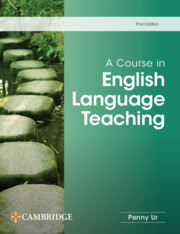Book contents
- Frontmatter
- Contents
- Acknowledgements
- Introduction
- 1 Teaching English today
- 2 The lesson
- 3 Classroom interaction
- 4 Tasks
- 5 Texts
- 6 Teaching vocabulary
- 7 Teaching grammar
- 8 Teaching listening
- 9 Teaching speaking
- 10 Teaching reading
- 11 Teaching writing
- 12 Feedback and error correction
- 13 Assessment and testing
- 14 The syllabus
- 15 Teaching/learning materials
- 16 Teaching content
- 17 Classroom discipline
- 18 Digital technology and online teaching
- 19 Learner differences 1: age
- 20 Learner differences 2: diversity and inclusion
- 21 Teacher development
- Glossary
- References
- Index
- Frontmatter
- Contents
- Acknowledgements
- Introduction
- 1 Teaching English today
- 2 The lesson
- 3 Classroom interaction
- 4 Tasks
- 5 Texts
- 6 Teaching vocabulary
- 7 Teaching grammar
- 8 Teaching listening
- 9 Teaching speaking
- 10 Teaching reading
- 11 Teaching writing
- 12 Feedback and error correction
- 13 Assessment and testing
- 14 The syllabus
- 15 Teaching/learning materials
- 16 Teaching content
- 17 Classroom discipline
- 18 Digital technology and online teaching
- 19 Learner differences 1: age
- 20 Learner differences 2: diversity and inclusion
- 21 Teacher development
- Glossary
- References
- Index
Summary
What is grammar?
The term grammar includes syntax and morphology. Syntax is the way words are chosen and combined to make correct sentences: so in English I am a teacher is grammatically acceptable, *I a teacher, and *I are a teacher are not. Morphology is the grammar of single words: it includes features like the plural -s of nouns, or the past tense of verbs. English morphology is fairly simple, compared to many other languages: grammatical affixes are all suffixes, and there is a limited number of them. It is the syntax, on the whole, which is more difficult for learners and needs more careful teaching.
Grammar is not just a matter of correct forms; it also carries meaning. The meaning of a particular message in a communicative situation is created by a combination of vocabulary and grammar. We use grammatical items and constructions to express, for example, time (using tenses) or place (using prepositions) or possibility (using modals or conditional clauses). It is often the meanings that create problems for students rather than the forms (for example, when contrasting present perfect simple I have done my homework with present perfect progressive I have been doing my homework).
What students need to learn: standards of grammatical acceptability
There is some debate these days as to what standards of grammatical accuracy should be applied to English as it is taught and learned in the classroom. How much should we worry about grammatical accuracy if mistakes do not interfere with meaning? Surely, it is argued by some, the main purpose of language is communication, so it shouldn't matter if you make a minor slip in morphology or syntax, so long as the communicative message is clear. For example, should we correct a student who drops the third person -s suffix in the present simple (saying she like instead of she likes)? And should we correct which instead of who in relative clauses relating to a person (the man which instead of the man who)? Should we only correct such variants when they actually make the meaning unclear or misleading – for example, when a student uses a present tense verb where a past tense is needed to convey an appropriate message?
Information
- Type
- Chapter
- Information
- A Course in English Language Teaching , pp. 85 - 98Publisher: Cambridge University PressPrint publication year: 2024
